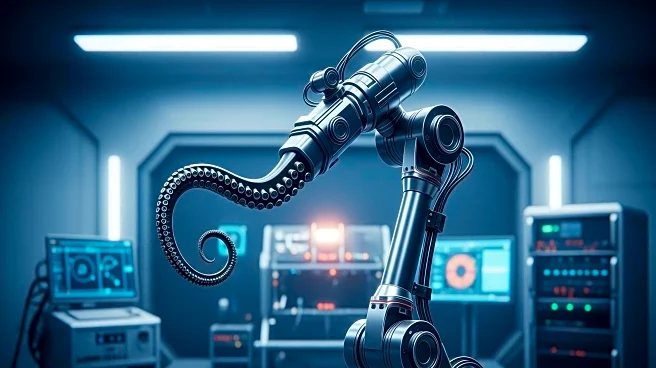What's Happening?
Researchers at the Marine Biological Laboratory in Massachusetts have catalogued the complex arm movements of wild octopuses, identifying 12 distinct actions that these creatures use to perform tasks such as probing rocks for food. This study, led by Roger Hanlon, involved video recording 25 octopuses across various habitats, including coral reefs and seagrass beds. The team analyzed 120 minutes of footage to identify unique behaviors and arm actions, creating a hierarchically organized ethogram. The findings highlight the octopus's tactile nature, with each sucker acting as a chemotactile sensor. The study aims to inspire the development of advanced robotic systems capable of performing sensitive tasks like search and rescue operations.
Why It's Important?
The research on octopus arm movements holds significant implications for the field of robotics, particularly in designing systems for search and rescue missions. Octopus arms are known for their flexibility and sensitivity, qualities that are highly desirable in robotic applications. By understanding the biomechanics and coordination of octopus arms, engineers can develop robots that mimic these movements, potentially improving their ability to navigate complex environments and perform delicate tasks. This could lead to advancements in robotic technology, enhancing capabilities in disaster response and other critical areas.
What's Next?
The insights gained from this study are expected to refine existing robotic models by incorporating the deformations required for specific movements. Researchers hope to apply these findings to create robotic systems that can accurately imitate octopus arm movements, thereby enhancing their functionality in real-world applications. Future research may focus on further understanding the control mechanisms of octopus arms to improve robotic design and performance.
Beyond the Headlines
The study also sheds light on the intelligence of octopuses, drawing parallels between octopus and human brains. This could lead to broader discussions on the cognitive abilities of invertebrates and their potential applications in artificial intelligence. The tactile nature of octopus arms may inspire new approaches in sensory technology, influencing fields beyond robotics.








